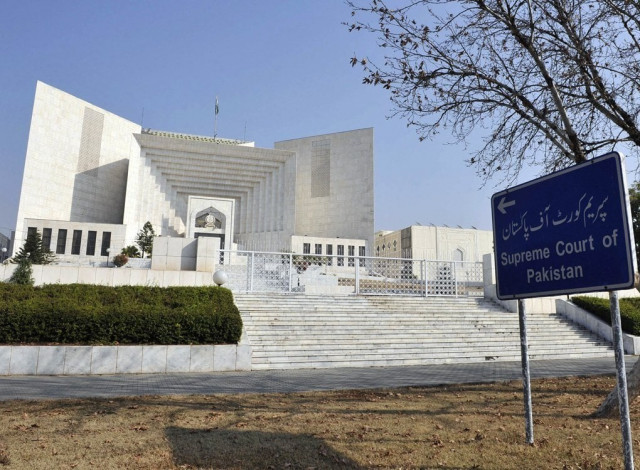Defections delegitimise democracy: SC
Legal experts hail judgement; say it will have long-lasting effect on parliamentary system of governance

The Supreme Court on Friday issued a detailed written opinion on the interpretation and scope of Article 63-A and held that the vote of the member in default is to be disregarded as it is only in this way that the “healthy” operating of political parties will be maintained and the balance among the political parties will not be disturbed.
Therefore, the verdict noted, there was an “obvious, immediate and natural connection between the two provisions” and emphasised that to try and apply Article 63-A on a standalone basis, in isolation from and disregard of Article 17(2), only offers at best a partial solution to the problem of defections.
The 95-page majority judgment issued by the top court said a dissident member’s vote cast against his party guidelines would not be counted. However, the period of disqualification of a dissident member should be determined by the parliament.
The detailed opinion, which came after five months, is authored by Justice Munib Akhtar and endorsed by Chief Justice of Pakistan (CJP) Umar Ata Bandial and Justice Ijazul Ahsan.
A five-judge larger bench on May 15 issued a short opinion on the presidential reference regarding the scope and interpretation of the said article of the constitution.
Two judges – namely Justice Mazhar Alam Miankhel and Justice Jamal Khan Mandokhail – had dissented and have already issued detailed rationale behind their respective opinions.
Certainly, the verdict continued, it (partial solution) does not strike “this evil and menace at the root” and explained that this was so because the constitutional foundation, anchored in a fundament right, would not have been taken into consideration.
On the other hand, once it is recognized that the two provisions are intertwined then Article 63-A can be given full effect. Put differently, the apex court noted, Article 63-A comes into full flowering only when it is viewed from the perspective of Article 17(2).
‘Thin line between re-writing and interpreting’
A senior lawyer commenting on the detailed opinion has said that there is a thin line between interpretation and re-writing the constitution.
"That line has been crossed in this opinion several times over. If this view continues to hold then we are in danger of sliding away from constitutional government to government by judiciary,” he warned.
Article 63-A of the Constitution stipulates the conditions of defection by a lawmaker and its consequences. Whereas Article 17 (2) allows every citizen, not being in the service of Pakistan, to form or be a member of a political party.
The majority opinion observed that the defections attack and undermine Article 17(2) at its very root.
"Howsoever viewed, defections (and, again, especially of the parliamentarians who comprise a political party’s parliamentary party) badly damage and can fatally compromise (at the very least, and almost certainly, during the ongoing election cycle) the “healthy” operating of political parties in all aspects of this requirement of the fundamental right that is set out in Article 17(2)," the judgement read.
It said that defections are a near absolute negation of this fundamental right.
“The conclusion, therefore, is clear: it is inherent in the very nature of Article 17(2) that it can be properly understood (and, to use the language of Article 184(3), enforced) if, and only if, it is applied in a strongly anti-defection manner that, if possible, deals (as it were) a deathblow to this evil and menace in all its manifestations.”
Put differently, the verdict elaborated, it is hardwired into the very structure and design of Article 17(2 and it is an important facet of the application of this fundamental right that defections are dealt with comprehensively and proactively.
The majority opinion also said that defection tends to demolish the “healthy” political competition and rivalry that is a sine qua non for Article 17(2).
"The parties may not be equal in practice but they are always equal in the eyes of the Constitution. The minnows must be able to swim freely with the whales, and neither should have to face even the threat of predatory attacks; there is no place for sharks in the waters that nourish Article 17(2).
‘Attack on integrity, cohesion of political parties’
The majority opinion termed defections “an attack on the integrity and cohesion of the political parties”, and said that they represent in an acute form the unconstitutional and unlawful assaults, encroachments and erosions which constitute a direct negation and denial of the rights encompassed in Article 17(2).
"There can be no healthy operating of, and among, the parties in the external aspect if defections are not thwarted and defeated. Indeed, the degradation—if not outright destruction—of healthy operating of parties in this manner is how and why the political bedrock established by the constitution can become destabilised and parliamentary democracy itself delegitimised.”
The court also said that it was also sought to be argued that if a proscribed vote cast contrary to a direction of the parliamentary party were to be disregarded that would lead to an elective dictatorship inasmuch as the prime minister or chief minister (as the case may be could never be removed from office.
"With respect, we are unable to agree. The whole argument, with respect, is based on a false premise: that the casting of a vote and the counting of it are one and the same thing. This is not so at all. That a vote is to be counted individually does not mean that it can (or must) therefore necessarily be cast in such a manner. If that were so, it would be wholly destructive of our system of parliamentary democracy, based as is it on political parties.
"The constitutional players in our system are the political parties. It is they, and not the individual members thereof who may be the candidates put up for election, who in terms of the fundamental right enshrined in Article 17(2) seek to pursue, acquire, retain and exercise political power. (Of course, individuals—the so-called “independents”—can and certainly do contest elections, but constitutionally speaking they are very much regarded as the fringe in the ordinary course of things.
The apex court went on to explain that it is only in “party-less legislatures” that “independents” thrive and come to the fore. That is the antithesis of our system of democracy.
Parliamentarians—the returned candidates—form the parliamentary parties which are the reflection in the legislative arena of the political parties. The majority party (or combination or alliance) forms the government of the day.
All of this and the ensuing business in the legislative and executive arenas throughout the relevant election cycle can only happen if the parliamentarians vote along party lines, it said.
The court also said that the holding of a meeting of the parliamentary party before it takes a decision to issue a direction or an insistence that the internal procedures of the political party, if any, be rigidly followed.
"What is clear is that the parliamentary party of a political party in an Assembly is a well-defined body, known to all concerned. Since it is a body of parliamentarians, any decision in terms of para (b) must have the support of (at least) the bare majority of the parliamentary party.”
"The taking of the decision and its communication may therefore be established in a such credible manner as satisfies the forum concerned, and it would not be appropriate to lay down any hard or fast rule in this regard. The totality of the circumstances in each actual situation must be kept in mind and given due weight and regard. However, for guidance the following procedure may be suggested,” the judgement said.
The court then directed that a copy of the direction, duly supported by the signatures of the majority of the parliamentary party, should be deposited with the secretariat of the assembly/house by or before the time it takes up for voting the matter to which it relates.
While notice ought also to be given to the members of the parliamentary party of the direction through any feasible means (including modern communication and messaging facilities), the deposit of the same in terms just stated will be deemed notice to them all.
In any case, the verdict held, it should at all times be regarded as the responsibility of a member of a parliamentary party to satisfy himself, before voting or abstaining to vote on any matter covered by Article 63-A(1)(b), whether his party has (or has not) issued a direction in terms thereof.
Lawyer’s opinion
Advocate Hafiz Ahsaan Khokhar while commenting on the SC judgment stated that first time the Supreme Court in detail has legally opined on various provisions of the constitution, Article 63-A, Article 91(7) and Article 95 with reference to defection by holding that defection is an attack on the integrity and cohesion not only on the political parties but represented in an acute form of unconstitutional and unlawful assaults, encroachments and erosions which constituting a direct negation and denial of the rights encompassed in Article 17(2) of the Constitution.
He said that the apex court has also clarified that the decision with reference to Article 63-A would be of the parliamentary party and not by the party head and the parliamentary party cannot delegate, transfer, assign or in any manner “outsource” the power conferred on it to anyone, including to the party head, and defection if made, Article 63(1)(p) of Constitution simultaneously confers the necessary competence on parliament and that matter has been left by the
Supreme Court to the legislature to suggest the magnitude of punishment to defectors.
According to him, though counting or not counting of votes for the process mentioned under Article 63-A of the Constitution is not there, the top court has stressed the spirit of Article 17(2) of the Constitution by declaring the defection for the first time a near absolute negation of the fundamental right granted under the Constitution, and further hold that defection can destabilize the parliamentary democracy, and ultimately held not to count these votes of members if they cast against the majority decision of a parliamentary party mentioned in Article 63-A of the Constitution.
He said that the present judgment of the SC would have a long-lasting effect on the parliamentary system of Pakistan and would close all doors of defection in Assemblies, and would promote the stability in our political system which, he said, was based on a parliamentary form of government, by also simultaneously giving the power to members of a majority of a parliamentary party to decide in any situation confronted as prescribed in Article 63-A of Constitution.
According to the constitutional expert, the judgment has empowered the majority of members of a parliamentary party which would try to control the unbridled authority of a party head as well in future with reference to the application of Article 63-A of the Constitution and has tried to thwart and defeat this menace in a political and parliamentary culture of Pakistan.



















COMMENTS
Comments are moderated and generally will be posted if they are on-topic and not abusive.
For more information, please see our Comments FAQ